While deep learning is generally considered to be a small branch of the tree of artificial intelligence, it’s already a branch that seems to be outgrowing the tree itself. Deep learning is the development of ‘thinking’ computer systems, called neural networks, and utilizing it requires coding strategies foreign to old-school programmers. With the help of deep learning, we can teach our computers to learn for themselves in a way that gives us actionable results. And, you have the chance to be at the forefront of it all, as specialists in deep learning are needed now more than ever before.
We’ve compiled this list of the best deep learning courses to help you get ahead of the curve. If you’re looking to start a career in deep learning, then these training programs will serve as an excellent starting point for a prosperous career. Or, if you’re already familiar with the fundamentals of deep learning, then one of the more advanced courses on this list might be a perfect suit for you.
We’ve selected these courses based on their accessibility, variety, and lesson structure, among other factors. Whether you’re a budding coder looking to break into AI or someone just looking to gain a cursory knowledge of knowledge engineering, these are all good choices for you if you’re wondering how to learn deep learning algorithms.
Without further ado, let’s break the best of them down, one by one.
Best Deep Learning Courses
Best Overall Course: Deep Learning Nanodegree (Udacity)
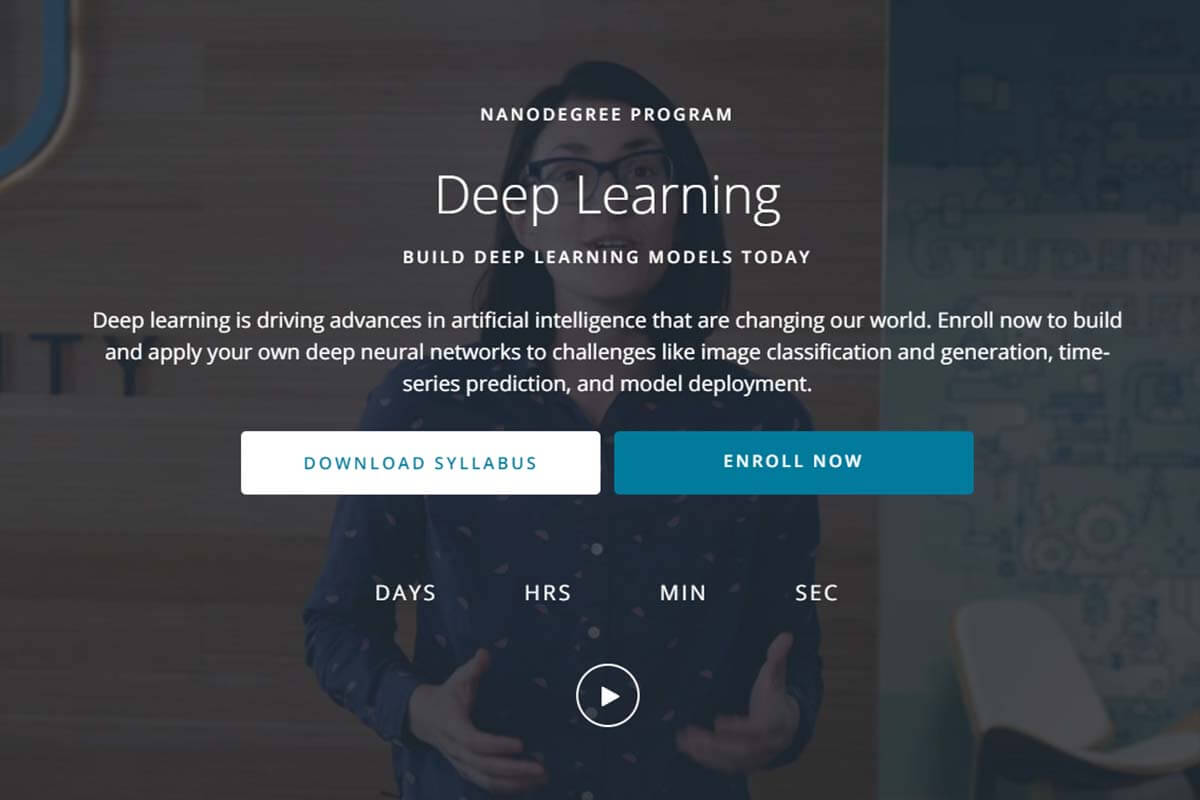
- One-on-one mentorship with industry experts
- Chance to develop your AI product skills with real-world projects
- Led by Silicon Valley entrepreneurs
Cons
- Requires prior understanding of Python
Who can take this course: This deep learning certification is best for students with a basic working knowledge of Python programming. However, the course starts with relatively simple lessons, so it’s certainly possible to learn programming hand-in-hand with this course. Prior knowledge in deep learning is not required.
What you’ll learn: Anyone looking to integrate a combined and comprehensive deep learning certification into their skillset will benefit from this course. This online course covers many topics related to artificial intelligence, but it goes the deepest into deep learning with neural networks. At first, students get a general overview of neural networks, and then the course gets more specific by diving deeper into convolutional neural networks and recurrent neural networks separately.
Using five specially designed projects, this course teaches its students how to set up neural networks capable of different tasks such as image recognition and classification. Additionally, you will learn the basics of setting up the core systems of AI-assisted tasks and executing projects that use PyTorch and Amazon Sagemaker as tools.
And finally, when you pass this course, you will be automatically admitted into Udacity’s more advanced courses on the topic of AI – the Self-Driving Car Engineer and Flying Car and Autonomous Flight Engineer programs. It should be mentioned, though, that you will need to pay for those programs separately, despite being automatically admitted after graduation.
Verdict: This deep learning course from Udacity gives students an excellent foundation of knowledge by using Python as the framework for deep ‘earning algorithms. The course syllabus is easy to follow considering the technical subject areas, and the instructors teach complex ideas in simple ways. The course starts with the basics before diving deeper into the more advanced lectures, giving students a chance to catch up easily. Finally, the course has an all-star team of Course instructors, filled with deep learning experts from Google and various prestigious STEM universities.
All in all, “Deep Learning Nanodegree” by Udacity is, without a doubt, one of the very best deep learning courses currently available.
Best Free Access: Deep Learning Specialization (Coursera)
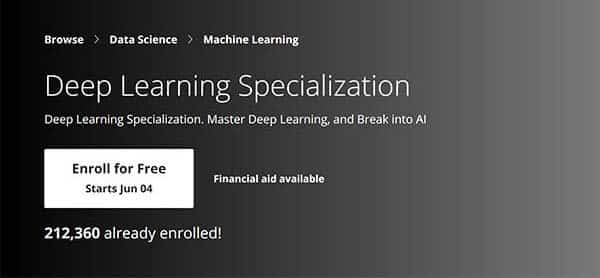
40% ($140 USD) off your first year of Coursera Plus Annual (expires 2 December 2024)
- Course instructor is a Stanford professor and an industry expert
- Easy to follow course material
- Course material can be accessed for free
Cons
- Course content could use an update for 2022
- Prior programming skills are necessary
Who can take this course: This deep learning certification program from Coursera is ideal for students who know basic Python programming and algebra. Prior knowledge in deep learning is considered beneficial, but not compulsory.
What you’ll learn: This deep learning course covers various topics in the field of A.I and deep learning, such as:
- Neural Networks (Convolutional)
- Hyperparameter tuning, Regularization, and Optimization
- Structuring Deep Learning Projects
- Sequence Modelling (in the context of natural language processing)
The names of these topics might seem confusing at first, but the course instructor has done an excellent job at making the syllabus easy to understand and follow. The material starts off with the basic knowledge, before moving on to the more technical know-how of deep learning.
When you complete this course, you will have a solid foundation of skills that you can use to start building your own convolutional neural networks. The inclusion of natural language processing lectures in the course syllabus is also a very welcome addition to the curriculum. Many courses on this list failed to cover NLP in detail, even though it could be considered one of the key topics in deep learning.
Verdict: This is by far the best deep learning course that you can access for free. No other free deep learning courses even came close to the level of depth that this course has. “Deep Learning Specialization” on Coursera is on par with courses costing hundreds of dollars, so the price-to-quality ratio for this one is off the charts. As is the case with most of the deep learning courses on this list, it does require some prior knowledge in programming, though, which could be a setback for some.
This online course was voted the best deep learning course by FloydHub – a hub for all things A.I.
Best for Beginners: Complete Guide to TensorFlow for Deep Learning with Python (Udemy)
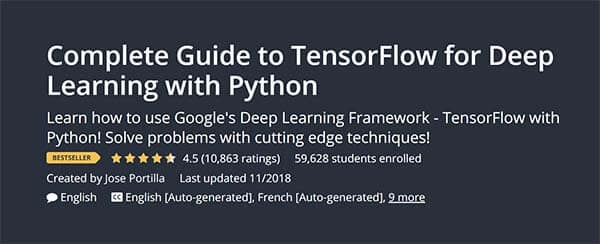
New customer offer! Top courses from $14.99 when you first visit Udemy (expires 31 March 2024).
- Comprehensive TensorFlow and Python exercises
- Good mixture of theory and practical exercises
- Competitive price point
Cons
- Only 14 hours of content
- Limited to Google’s suite of services
Who can take this course: Anyone who wants to dive into Google’s TensorFlow system stands to benefit the most from this course. The course content is introductory in nature, so prior knowledge in programming is not compulsory (although it will be beneficial).
What you’ll learn: This online training program will give you basic knowledge of Python, deep learning, A.I, and mathematics, making it a comprehensive introduction to the basics of deep learning and neural networks. Using the TensorFlow framework as the basis for the course, Jose Portilla teaches students deep learning in a specific context that shies away from abstraction. He gives students an excellent overview of the basics of deep learning and provides a springboard so that the students can start to build neural networks of their own.
The course explains the essentials of deep learning in a comprehensive way, before moving on to the more technical skills and exercises which will enable you to start building your very own neural networks. It’s not the most advanced deep learning course out there, but it does an excellent job at covering the fundamentals.
Verdict: If you’ve ever thought of fully immersing yourself in a TensorFlow course as a way to gain experience in deep learning, then the “Complete Guide to TensorFlow for Deep Learning with Python” is the course for you. This course is one of the best deep learning online courses out there. Especially for those who want to learn how to use Google’s Deep Learning Framework without having advanced knowledge in Python. For these reasons, we consider it the best deep learning course for beginners.
Deep Learning A-Z: Hands-On Artificial Neural Networks (Udemy)
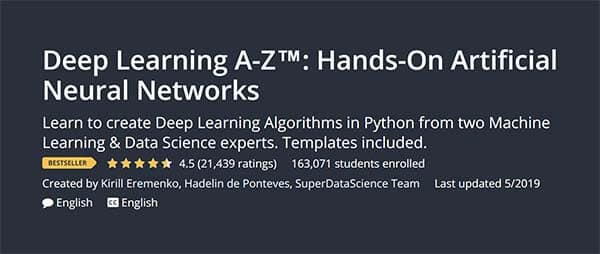
New customer offer! Top courses from $14.99 when you first visit Udemy (expires 31 March 2024).
- Good starting point for beginning coders
- Plenty of TenserFlow and PyTorch exercises
- Teachers are very hands-on and involved
Cons
- Some codes are a little outdated
- Existing basic programming skills are necessary
Who can take this course: Students interested in getting into the thick of coding their own deep learning algorithms should take this course. Alternatively, those looking for a program that teaches deep learning training with PyTorch and TensorFlow will find lots to learn from this course. The material is relatively basic in nature, so this course could be considered beginner-friendly.
What you’ll learn: The course starts off with teaching students the basics of what builds a neural network and the role of deep learning in developing software solutions. After that, the course continues by offering a good balance of TensorFlow and PyTorch exercises. It has students recreate real-world examples of deep learning software such as recommender systems and image recognition programs. The detailed step-by-step exercises ensure that the technical parts are easy to follow, and the theory classes are easy to understand.
Verdict: For people who have light experience in coding, “Deep Learning A-Z” is a solid pick. Not only does it provide a good overview of the two most-used open source libraries used in deep learning, but it also gives an excellent overview of the common applications of deep learning in everyday applications.
Deep Learning, by 3Blue1Brown (YouTube)
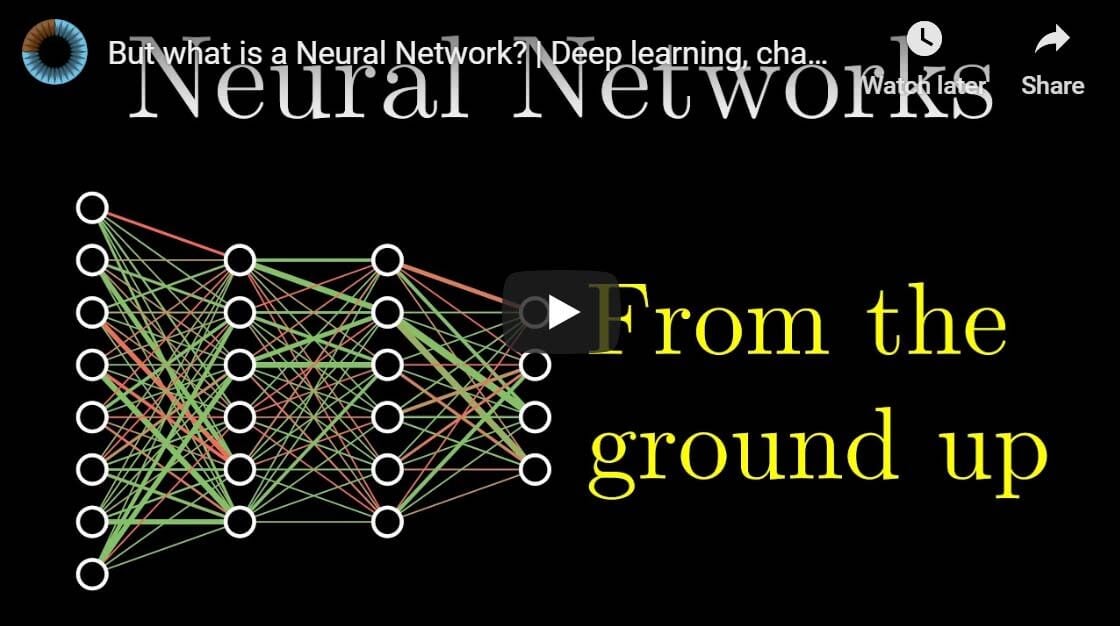
- Complex topics explained in easily understandable ways
- Contains helpful illustrations
- Easy to follow, conceptual teaching techniques
Cons
- Shorter than all other deep learning courses on this list
- Learning is very passive as it contains only video lectures
Who can take this course: This deep learning course is unlike all others on this list. It’s very easy to follow, it does not require any prerequisite knowledge, and it’s suitable for absolutely anyone interested in deep learning and neural networks.
What you’ll learn: This video course, created by YouTuber 3Blue1Brown, will teach you not only the basics of neural networks, but also how the human brain works, and how it handles problem-solving. The videos are full of illustrative pictures, graphs, and animations, which make the course material very easy to follow and understandable.
There are 4 video chapters in total, each of which answers a different question:
- What is a neural network?
- Gradient descent, how do neural networks learn?
- What is backpropagation really doing?
- Backpropagation calculus
All of the videos are illustrated beautifully, and they prove that difficult subjects CAN be taught with simple methods. In terms of accessibility, this is the most beginner-friendly deep learning course we have seen.
Verdict: This series of videos by 3Blue1Brown was created in 2017, which is a relatively long time for a technical topic. However, to this date, they are still one of the most informative deep learning videos out there. If you haven’t yet checked out 3Blue1Brown’s channel on YouTube, then we highly recommend you do so.
Deep Learning: Recurrent Neural Networks in Python (Udemy)

New customer offer! Top courses from $14.99 when you first visit Udemy (expires 31 March 2024).
- Provides advanced exercises
- Techniques take advantage of the full capabilities of Python
- Expands on natural language modeling
Cons
- Lacking TensorFlow examples
Who can take this course: Data engineers looking to gain some experience with deep learning are the ideal candidates for this course. The course requires you to have prior knowledge of the basics of deep learning algorithms alongside experience with Hidden Markov models.
What you’ll learn: Visualization of the structure that makes up deep learning programs is one of the most challenging parts of designing a program. This course allows you to dive into the technical aspects of adding time concepts to your neural networks, by integrating more advanced algorithms to generate even better content.
Verdict: If you’re looking for a more complex way to make your deep learning program generate content such as written output, “Deep Learning: Recurrent Neural Networks in Python” is ideal for you. You’ll be able to refine how your neural networks collect and identify data, build a framework using a recurrent neural network, and generate content that is far superior to usual neural network models. For advanced students, this is a very good deep learning course.
Advanced AI: Deep Reinforcement Learning in Python (Udemy)
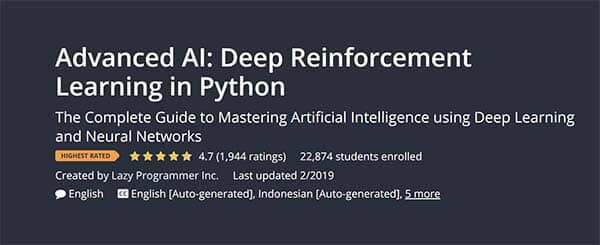
New customer offer! Top courses from $14.99 when you first visit Udemy (expires 31 March 2024).
- Teaches applying deep learning to reinforcement learning
- Covers how neural networks interact with the real world
- Explores different methods of building neural networks
Cons
- Some experience with deep learning basics required
Who can take this course: Ideal students for this course are technical-minded data professionals looking for the latest developments in AI techniques via deep learning. This course allows you to flex a little more creativity in methods to create neural networks and looks at different solutions to solving the problem of interaction between program and data.
What you’ll learn: Reinforcement learning is having your program actively interact with a data set. This course teaches you how to set up a deep learning algorithm that doesn’t just integrate existing data but actively seeks out the best possible solution or configuration according to what it learns. In other words, it’s about building deep learning programs that are actively striving to attain an ideal solution, rather than just formulating their own out of the data that’s been given.
Verdict: Learning about the different methods of teaching deep learning systems can be useful to data engineers who want to build sophisticated deep learning programs. “Advanced AI: Deep Reinforcement Learning in Python” is an excellent guide into the different possibilities that can be used to build a goal-oriented deep learning program.
Deep Learning with Keras 2 (Pluralsight)
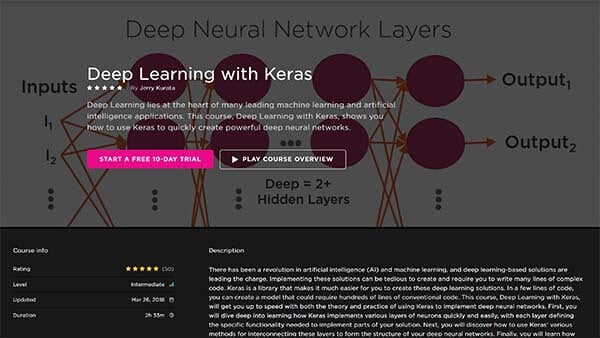
- Video material is easy to follow
- Course instructor explains complex ideas in simple ways
- Good mixture of practical and theory exercises
Cons
- Rather short course material
- Does not cover the absolute basics of deep learning and A.I
Who can take this course: This deep learning course is basic in nature, but it’s still best suited for students who have some prior skills in programming (mainly Python).
What you’ll learn: The primary aim of this training program is to teach students how to use the Keras Deep Learning Library. Keras is one of the most useful resources for creating deep learning programs with Python, and this makes Jerry Kurata’s course very valuable for anyone looking to use deep learning with the Python programming language.
The course begins with an introductory session that explains the basics of Keras and neural networks, before moving on to more complex subjects. Students who take this course will learn how to construct models in Keras, how to work with layers in Keras, and ultimately – how to build both convolutional and recurrent neural networks through Keras.
The course material is very practical and hands-on, making it very valuable for anyone who wants to start building projects straight from the get-go.
Verdict: A 2.5-hour course is not enough to cover all the important details of deep learning. However, we found that despite the short course material, the instructor managed to cover an impressive amount of topics, with plenty of real-life examples and useful tips regarding working with Keras.
It’s not the most in-depth deep learning course in terms of content length, but it’s one of the most practical and straight-to-the-point. We highly recommend “Deep Learning with Keras 2” to anyone who is interested in creating neural networks through Keras and Python.
Introduction to Deep Learning (Coursera)
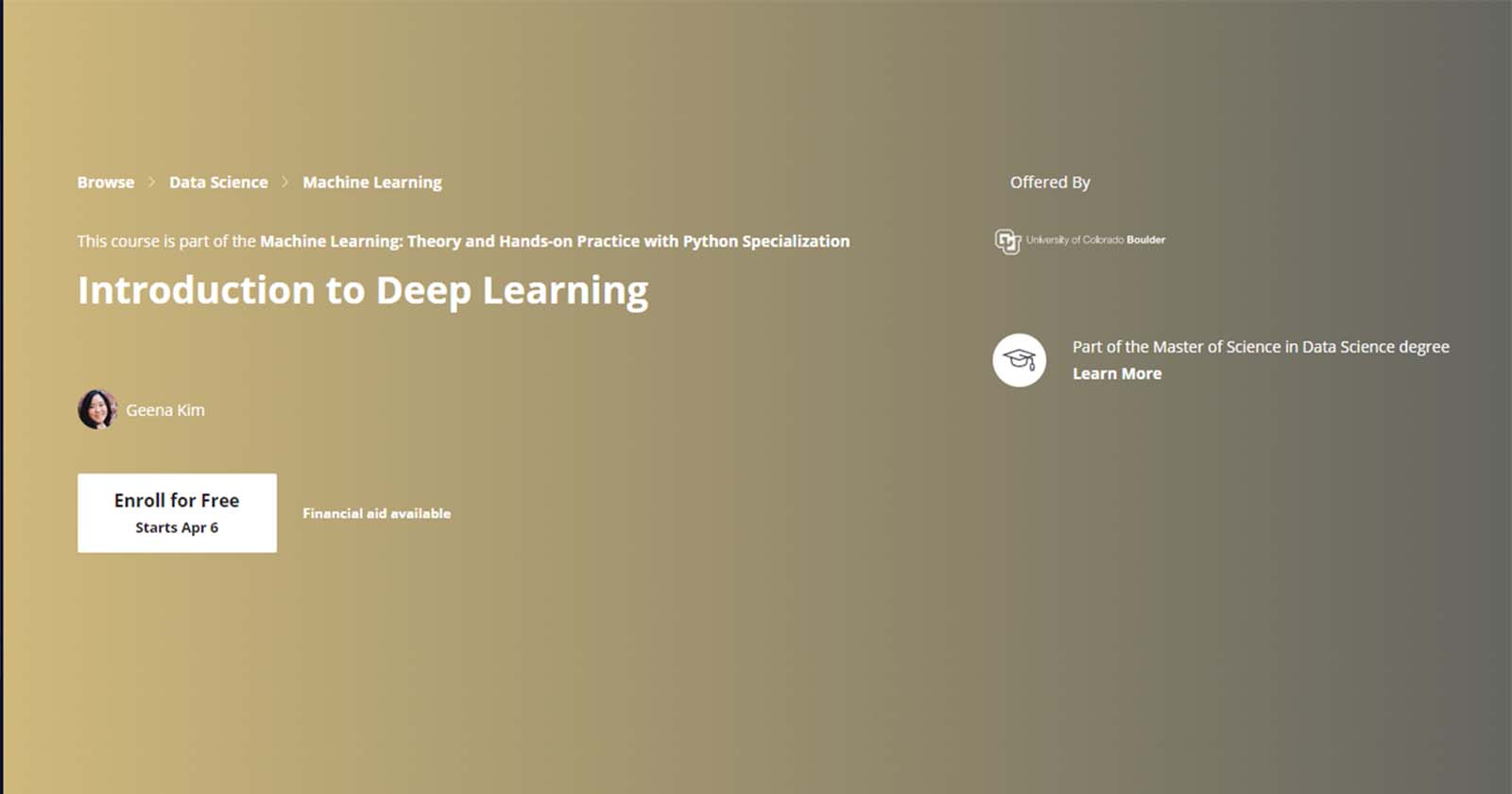
40% ($140 USD) off your first year of Coursera Plus Annual (expires 2 December 2024)
- Good material for referencing deep learning basics
- Exercises using Python and TensorFlow
- Leads into other courses
Cons
- Limited exercises versus theory lessons
Who can take this course: Those already familiar with the basics of machine learning and are studying its subsets are the best fit for this course.
What you’ll learn: This course teaches students about the basics of neural networks, the kinds of data that you can expect to use them on, and the applications you can create that use these processes. Learn about how your algorithms can generate content from context and generate actionable data from raw input. It also gives a succinct explanation of the role of deep learning in different directions of AI, and shows basic examples of each.
Verdict: The “Introduction to Deep Learning” is a learning program that’s best for those who already have some idea of what deep learning is. It can help experienced coders by providing a refresher on what makes deep learning so important when it comes to AI.



